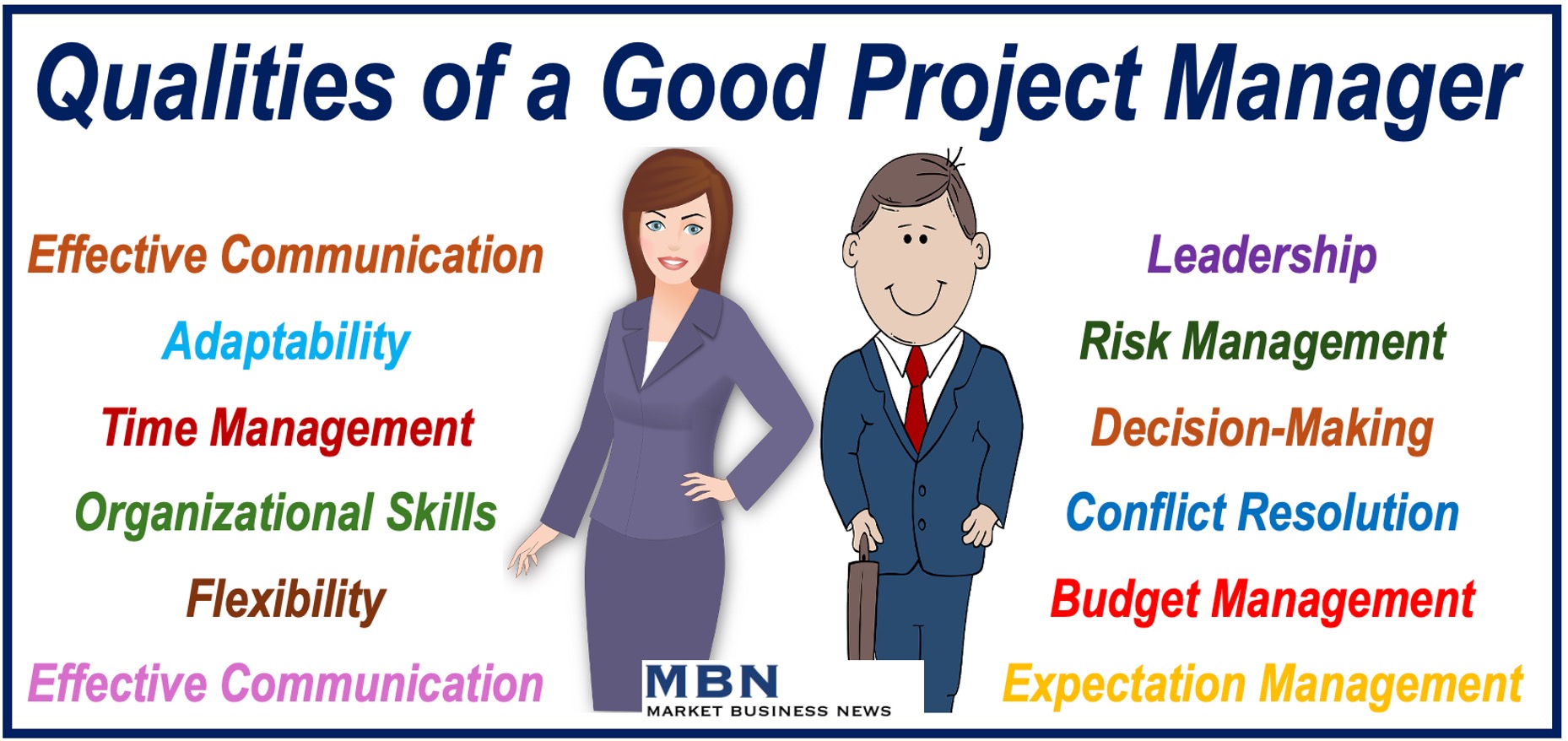A Project Manager is somebody who organizes, plans, and carries out projects. They must work within the budgets and deadlines set by clients or supervisors.
If you are a project manager, you will lead a team, define the goals of your project, regularly communicate with stakeholders, and make sure the project is complete.
Project managers are responsible for their project’s success (or failure). In other words, they are accountable for the successful delivery of the project.
Coursera.org has the following definition of the term project manager:
“A project manager is a professional who organizes, plans, and executes projects while working within restraints like budgets and schedules. Project managers lead entire teams, define project goals, communicate with stakeholders, and see a project through to its closure.”
Role of a Project Manager
Project managers are at the helm of a wide range of projects across numerous industries including construction, healthcare, information technology, finance, manufacturing, marketing, education, energy, and telecommunications.
They apply their project management skills to turn visionary concepts into tangible results.
Project managers empower their teams with the resources and support needed to successfully navigate and complete projects.
They must:
- Define their project in detail, and sometimes in a way that lay people understand.
- Work within a set schedule and specific deadlines.
- Cost the project and adhere to a budget. In this case, ‘cost’ is used as a verb, meaning to estimate or calculate the total expenses required for the project.
- Manage teams, workers, and other project resources.
- Track, record, and report the project’s progress and performance metrics.
- Communicate with clients, supervisors, and other stakeholders.
- Troubleshoot.
- Ensure quality control to meet project standards and expectations.
- Track and report project performance metrics.
- Identify and resolve issues or bottlenecks that arise during the project lifecycle.
- Negotiate with vendors, suppliers, and contractors when necessary.
- Ensure compliance with legal and regulatory requirements.
- Carry out risk assessments.
Wikipedia.org says the following about risk assessments:
“Most of the project management issues that influence a project arise from risk, which in turn arises from uncertainty.”
“The successful project manager focuses on this as his/her main concern and attempts to reduce risk significantly, often by adhering to a policy of open communication, ensuring that project participants can voice their opinions and concerns.”
As a project manager, you’ll quickly discover that no two days are alike. The role involves a wide range of tasks—one day you might be negotiating prices with a key supplier, presenting progress updates to stakeholders, handling the dismissal of an employee, managing unexpected challenges or costs, or organizing training sessions for your team.

Qualities of a Good Project Manager
To excel as a project manager, it’s essential to develop a strong set of management skills and qualities. These abilities not only help you guide your team but also ensure the successful completion of projects. Here are the key skills every effective project manager should have:
-
Leadership
As a project manager, you must guide and inspire your team towards achieving the project’s goals. Good leadership fosters collaboration, boosts morale, and helps team members stay focused on their tasks.
-
Flexibility and Adaptability
Unexpected changes or obstacles are common. Being able to adjust your plans and adapt to new circumstances is critical for keeping the project moving forward without compromising its objectives.
-
Time Management
You must be skilled in managing your time, as well as the team’s time, to ensure tasks are completed efficiently and deadlines are met. Prioritizing tasks and avoiding bottlenecks are key to successful time management.
-
Organizational Skills
A successful project manager is highly organized, ensuring that every aspect of the project, from timelines to resources, is well-coordinated. This helps in keeping all project components aligned and on track.
-
Creative Problem-Solving
Projects rarely go as planned, and you must think creatively to solve issues that arise. This may involve finding innovative solutions to resource limitations or overcoming unforeseen technical challenges.
-
Effective Communication
You are the primary link between teams, clients, and stakeholders. Clear and consistent communication ensures that everyone is on the same page, avoiding misunderstandings and keeping the project aligned with its goals.
-
Risk Management
Identifying potential risks early in the project lifecycle and developing strategies to mitigate them is crucial. You must stay ahead of potential problems to minimize disruptions.
-
Decision-Making
Throughout the project, there will be moments where you have to make tough decisions quickly. You need to weigh your options carefully, considering both short-term and long-term impacts, and make decisions that will keep the project on track.
-
Conflict Resolution
In any team setting, conflicts may arise. A skilled project manager can mediate disagreements, ensuring that issues are resolved constructively and do not derail the project.
-
Budget Management
Ensuring the project stays within budget is a critical task. This involves careful planning, monitoring expenses, and making adjustments as necessary to avoid overspending while still meeting project goals.
-
Expectation Management
A project manager must set clear, realistic timelines for the team. As Julia Rittenberg and Cassie Bottorff note in a Forbes article, “The project manager has to set accurate and workable timelines for all the team members involved and make sure no one is being pushed to do sloppy work to meet an unrealistic deadline.”

Types of Project Managers
There are many different types of project managers. Let’s take a look at the ten most common ones:
-
Architectural
Oversees the design and execution of architectural projects, ensuring alignment with client requirements and budgets.
-
Construction
Manages construction projects from planning to completion, coordinating contractors, timelines, and budgets to meet project goals.
-
Engineering
Leads technical projects, collaborating with engineers and ensuring the delivery of complex systems or structures within scope.
-
Software Development
Manages software development efforts, coordinating teams and resources to ensure timely, high-quality software delivery.
-
IT Infrastructure
Oversees IT infrastructure initiatives, such as data center builds, ensuring technology systems are implemented smoothly and within budget.
-
Healthcare
Manages healthcare projects, coordinating teams to implement new processes, technologies, or facility upgrades.
-
Marketing
Oversees marketing campaigns and initiatives, ensuring they are executed effectively within deadlines and budgets.
-
Financial Services
Leads projects in financial institutions, managing regulatory compliance, system upgrades, or new service launches.
-
Manufacturing
Coordinates the production process, managing resources, timelines, and teams to ensure smooth manufacturing operations.
-
R&D (Research and Development)
Oversees innovation and product development initiatives, ensuring they progress efficiently from concept to market.
Becoming a Project Manager
To pursue a career as a project manager, it is important to have a university degree, ideally in business or project management. For specialized roles, such as those in IT, engineering, or construction, an undergraduate degree in a relevant field can be particularly beneficial.
According to Prospects.ac.uk (in the UK), “You don’t need a postgraduate qualification, but if your first degree is unrelated, a Masters could increase your chances of success. This is especially true of Masters programmes accredited by the Chartered Association for Project Management (APM).”
In English-speaking countries, many universities offer both undergraduate and postgraduate degree programs in project management.
- Information in the UK
A list of accredited academic organizations.
- Information in the US
A directory of recognized institutions offering accredited programs.
- Information in Canada
Accredited undergraduate and post-graduate courses.
- Information in Australia
Project management undergraduate courses and post-graduate courses.
Quick Recap
Let’s recap the key responsibilities and skills of a project manager. A project manager is responsible for organizing, planning, and executing projects while adhering to budgets and deadlines.
Their role spans across various industries, from construction to IT, requiring them to lead teams, manage resources, and communicate with stakeholders.
Key qualities for success include leadership, time management, effective communication, and problem-solving skills. Additionally, project managers must navigate risks, manage budgets, and resolve conflicts to ensure project success.
With the growing demand for skilled professionals, pursuing a career in project management offers diverse opportunities across multiple sectors.
